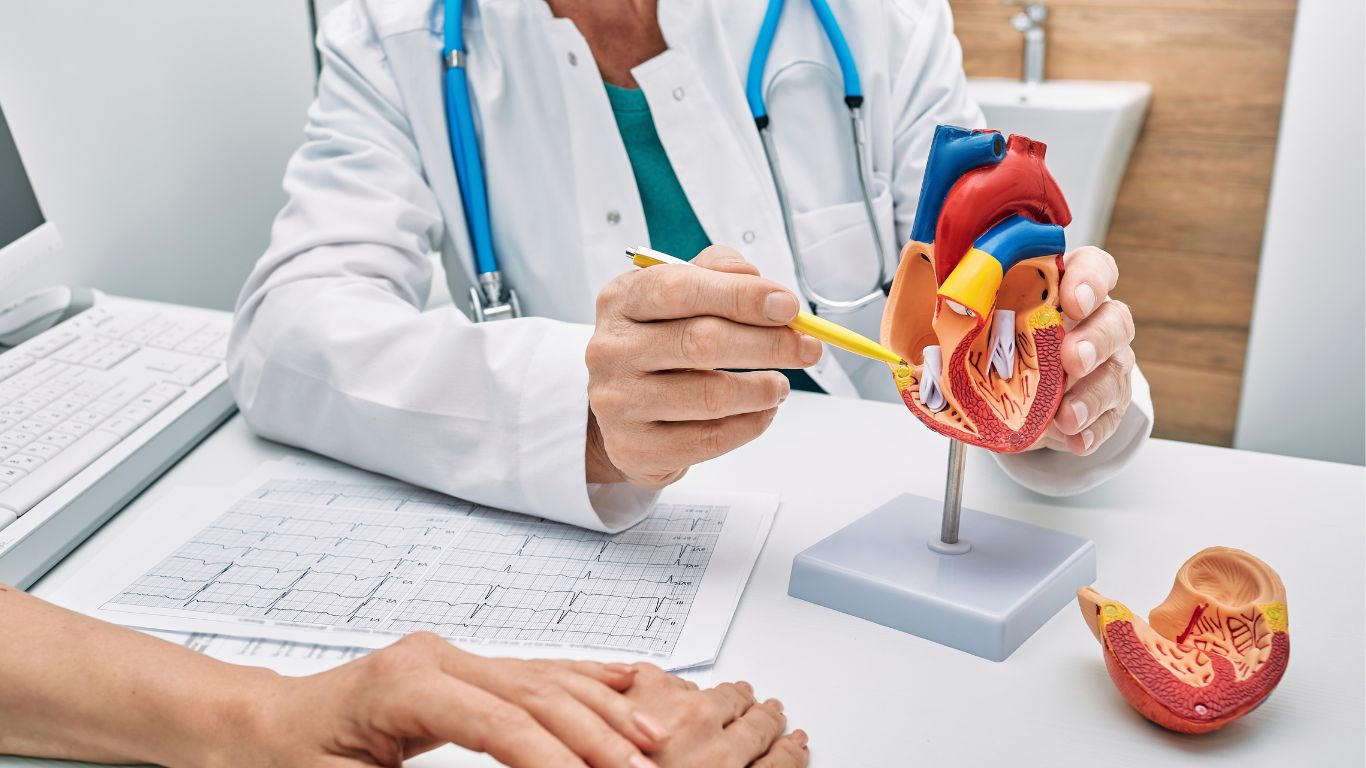 Advanced Cardiology Services at VRA Health – Consult Expert Cardiologists Online
Advanced Cardiology Services at VRA Health – Consult Expert Cardiologists Online
Your heart deserves the highest quality care. At VRA Health, our Cardiology Department is committed to providing comprehensive diagnosis, treatment, and prevention strategies for heart-related conditions. Whether you're managing high blood pressure, recovering from a heart attack (MI), or experiencing unexplained chest pain, our experienced cardiologists offer advanced care backed by the latest in cardiac diagnostics and technology.
What Does a Cardiologist Do?
A cardiologist is a medical specialist who focuses on the health of the heart and blood vessels. From routine heart screenings to emergency management of acute conditions like myocardial infarction (MI), cardiologists play a crucial role in preventing, diagnosing, and treating cardiovascular diseases. They also guide patients on lifestyle modifications to reduce risk factors such as high cholesterol, diabetes, and obesity, which are major contributors to heart disease.
When to See a Cardiologist
If you're experiencing any of the following symptoms, it's essential to consult a cardiologist:
-
Chest pain or tightness
-
Shortness of breath during activity or rest
-
Irregular heartbeat or palpitations
-
Dizziness or fainting spells
-
High blood pressure that is not well-controlled
-
Family history of heart disease or sudden cardiac death
-
Swelling in the legs or fatigue with exertion
Timely diagnosis and intervention can prevent complications and even save lives.
Common Conditions Treated in Our Cardiology Department
Our cardiologists specialize in diagnosing and treating a wide spectrum of heart conditions, including:
-
Coronary artery disease (CAD)
-
Heart attack or myocardial infarction (MI)
-
Congestive heart failure
-
Arrhythmias (irregular heartbeat)
-
Valvular heart disease
-
Cardiomyopathy
-
Hypertension (high blood pressure)
-
Hyperlipidemia (high cholesterol)
-
Peripheral artery disease (PAD)
-
Preventive cardiology and cardiac rehabilitation
Cardiac Diagnostic Services Available at VRA Health
Early detection is key in managing heart diseases. We offer a comprehensive range of non-invasive diagnostic tests, including:
ECG (Electrocardiogram)
A quick, painless test that records the electrical activity of the heart to detect abnormalities in rhythm or structure.
2D Echo (Two-Dimensional Echocardiography)
A specialized ultrasound of the heart that provides live images of the heart’s chambers, valves, and pumping function, essential for diagnosing heart failure, valve disease, and post-MI recovery assessment.
Treadmill Test (TMT)
Used to evaluate how the heart performs under physical stress, often used to detect blocked arteries.
Holter Monitoring
24 to 48-hour continuous ECG monitoring to detect intermittent arrhythmias or palpitations.
Lipid Profile and Cardiac Risk Assessment
Blood tests that evaluate cholesterol levels and help assess risk for heart attacks and stroke.
Expert Cardiac Care – Online and In-Clinic
At VRA Health, you can book a cardiologist consultation online, ensuring access to quality care regardless of your location. Whether you need a second opinion, medication adjustment, or routine follow-up, our digital platform allows you to speak with a heart specialist quickly, privately, and conveniently.
Why Choose VRA Health for Cardiology?
-
Highly experienced and board-certified cardiologists
-
Access to advanced diagnostic tools like 2D Echo and ECG
-
Comprehensive care for both preventive and emergency cardiac conditions
-
Seamless coordination for medication, lifestyle counseling, and follow-ups
-
Patient-first approach with clear communication and compassion
Prevention Is the Best Protection
Cardiovascular disease is one of the leading causes of death globally—but many cases are preventable. Our cardiologists focus not only on treatment but also on prevention through:
-
Routine screenings
-
Diet and exercise counseling
-
Cholesterol and blood pressure control
-
Smoking cessation support
-
Stress management techniques
Even if you’re asymptomatic, a routine check-up with a cardiologist can help identify risks early and prevent future complications.
Testimonials
"I had no idea my blood pressure was dangerously high until I consulted a VRA Health cardiologist online. The quick diagnosis and treatment plan changed my life."
– Ravi N., Mumbai
"After experiencing mild chest discomfort, I did a 2D Echo and ECG at VRA Health's clinic. The team was professional, fast, and thorough."
– Leela S., Hyderabad
Book Your Cardiologist Appointment Today
Don’t wait until symptoms worsen. Whether it’s your first consultation or a follow-up for a known condition like MI, high blood pressure, or irregular heartbeat, early evaluation can make all the difference. Book a consultation with a VRA Health cardiologist today and take charge of your heart health.

